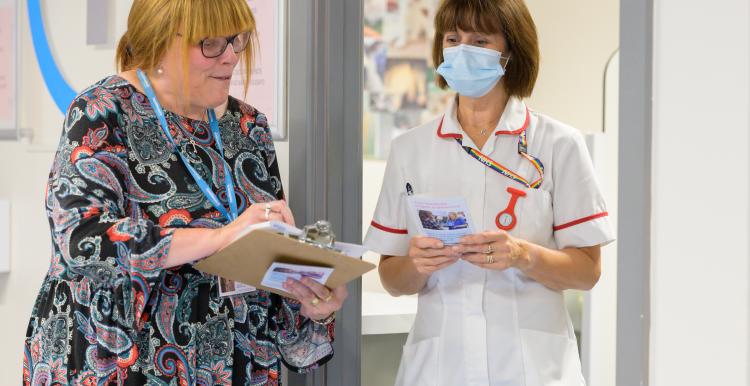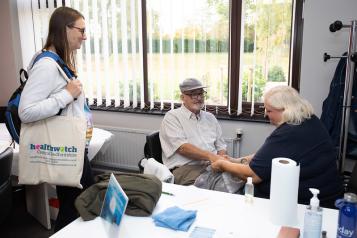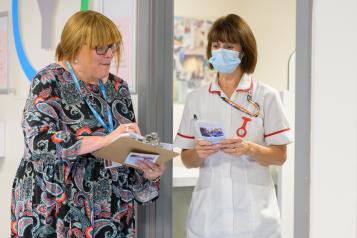Getting to know GP Practice Staff Roles
But who are they, and what do they do?

Your GP practice team is there to help you. Made up of a number of different professionals who can provide different types of care. Depending on your needs, you may be seen by a healthcare professional other than your GP. This is so you can get the right care at the right time.
Below is a list of professional you may see at your GP practice who may be available to help you with your health and wellbeing.
(Please note: Not all of the listed healthcare professionals are available at all GP practices.)
Reception team
Reception staff, sometimes called Care Navigators, are part of the General Practice team. They can help by:
- Getting you an appointment with the right person as quickly as possible.
- Identifying services you can access with a GP referral.
- Making appointments for healthcare services.
The reception team may ask you questions in order to direct you to the right type of care. They have received training in order to direct you to the right care. The questions they may ask help you access the right care, and the information you provide is confidential.
Clinical Pharmacist
Clinical pharmacists are health professionals who train for many years to become specialists in medicines. They can provide specialist services involving your medications by:
- Reviewing your medicines.
- Agreeing to and making changes to your prescriptions.
- Advising about medicines and possible side effects.
- Administering or referring you for tests, like blood pressure checks, to make sure your medicines are right for you.
Pharmacy Technician
Pharmacy technicians prepare and supply medicines for prescriptions, under the supervision of a pharmacist.
They can help you by:
- Showing you how to take your medicines.
- Supporting Clinical Pharmacists to review your existing medication.
- Advising you on lifestyle choices.
Paramedic
Traditionally, Paramedics have been most associated with emergency care, but their skills are equally transferable to GP patients with acute needs.
Paramedics may help you by:
- Assessing and treating some health conditions
- Attending home visits
- Ordering tests and interpreting the results.
Physiotherapist
Physiotherapists help to restore movement and function when someone is affected by injury, illness or disability. They can also help to reduce your risk of injury or illness in the future.
They can help you by:
- Diagnosing and treating muscular and joint conditions.
- Advising you on how to manage your condition.
- Referring you onto specialist services.
Mental Health Therapists and Practitioners
Mental health practitioners support individuals with their everyday mental wellbeing. The role is to support people whose needs are not met by local talking therapies, but who may not require ongoing secondary care services.
They can help you by:
- Carrying out assessments.
- Providing advice and support to manage your condition.
- Supporting you to manage your mental health.
Physician Associate
Physician associates are healthcare professionals with a generalist healthcare education who work alongside doctors and surgeons providing medical care. They can help you by:
- Diagnosing and treating certain health conditions.
- Arranging tests and analysing results.
- Performing physical examinations.
Occupational Therapist
Occupational Therapists help people who have difficulties carrying out day-to-day activities because of a disability, illness, trauma, ageing, and a range of long-term conditions.
They can help you by:
- Providing rehabilitation for you to stay well at home.
- Empowering you to make improvements in your day-to-day life.
- Supporting you to take control of your health and wellbeing.
Dietitian
Dietitians translate the science of nutrition into everyday information about food and advise people on their food and nutrition choices.
They can do this by:
- Diagnosing and treating nutritional conditions.
- Helping you to make changes to prevent and support long-term conditions.
- Supporting you to maintain a healthy weight.
Social Prescribing Link Worker
Social prescribing link workers connect people to community-based support, including activities and services that meet practical, social, and emotional needs that affect their health and wellbeing. This may include services for housing, financial and welfare advice.
They can help you by:
- Supporting you to manage your health and wellbeing.
- Giving you time to focus on what matters to you.
- Helping you to access support services and activities.
Health and Wellbeing Coach
Health and wellbeing coaches support people to increase their ability to self-manage, motivation levels and commitment to change their lifestyle. They are experts in behaviour change and aim to improve health through changing behaviour.
They can help you by:
- Providing coaching and support to help you manage your health.
- Working with you to identify your health and wellbeing goals.
- Signposting you to helpful resources and groups.
Care Co-ordinator
Care co-ordinators help to bring together different teams to support your health and care. They can support you to become more active in their own health and care.
They can help you by:
- Preparing you for upcoming conversations about your health and care.
- Monitoring your needs and responding to changes.
- Supporting you to understand and manage your care.
Healthcare Assistant
Healthcare Assistants deliver and assist clinical staff in the provision of treatment, preventative care, health promotion and patient education.
They can help you by:
- Performing tests including:
- Blood pressure, temperature, pulse rate etc.
- Administering Flu vaccinations.
- Assisting with clinical treatments.
- Tending to dressings.
General Practice Nurse
General Practice Nurses can be involved in most aspects of patient care.
They can help you by:
- Performing tests including
- Blood tests, ECGs, blood pressure, screening etc.
- Managing wounds
- Administering vaccinations
- Screening and helping you manage long term health conditions
Podiatrists
Podiatrists can help diagnose and mange conditions of the feet, ankles and lower limbs.
They can help you by:
- Assessing foot health.
- Performing diabetic foot health checks.
- Would management.
Common questions
These questions are often asked about the GP practice team and their work.
-
Why are receptionists asking me personal questions?
Receptionists are trained to know about the care and services available to you. Their questions make sure you are seen by the right person at the right time. All of the information you give is kept confidential.
-
I want to see my GP, why am I seeing someone else?
You might not always need to see a GP. GPs are now responsible for more patients, so to make sure people get the right care as soon as possible you may see another professional.
Nurses, Pharmacist etc. are all trained professionals who can diagnose and treat a range of conditions, helping you cat the care you need sooner.
-
What is triage?
Triage (also called assess and prioritise) is how the GP practice team find out more about the support you need. The questions help decide what health professionals you see and when.
-
Do I have a choice about who I see?
You can ask to see a particular Doctor, Nurse or other healthcare professional at your GP practice. The practice must try to meet your preferences however there are some cases where this may not be possible:
- The particular doctor, nurse or other healthcare professional is on leave, or at full capacity with no available appointments.
- You need an urgent appointment and your choice of doctor, nurse or healthcare professional is not immediately available.

